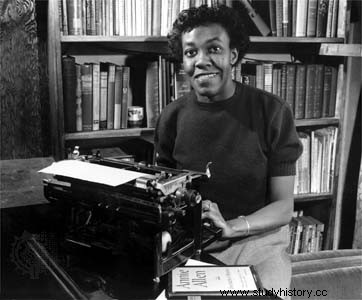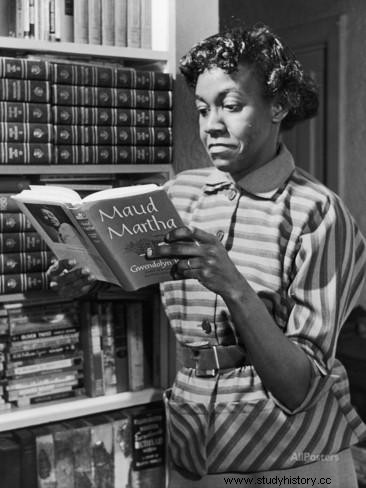The poet Gwendolyn Brooks (1917 – 2000) received numerous awards for his committed work; she was, in particular, the first black woman to receive the Pulitzer Prize for her collection of poems Annie Allen .
Segregation
 The eldest daughter of schoolteacher and pianist Keziah Brooks and janitor David Anderson Brooks, Gwendolyn Elizabeth Brooks was born on the 7th June 1917 in Topeka, Kansas. A few weeks after his birth, during the Great Afro-American Migration, his family moved to Chicago; she will remain there all her life, very attached to her city and to its citizens.
The eldest daughter of schoolteacher and pianist Keziah Brooks and janitor David Anderson Brooks, Gwendolyn Elizabeth Brooks was born on the 7th June 1917 in Topeka, Kansas. A few weeks after his birth, during the Great Afro-American Migration, his family moved to Chicago; she will remain there all her life, very attached to her city and to its citizens.
Gwendolyn first studied at Hyde Park High School , to predominantly white students, then Wendell Phillips High School , attended exclusively by black students. She finished high school at Englewoos High School , a more mixed establishment, before obtaining a university degree in 1936. The segregation and racism she experiences in these establishments with different realities give her a great knowledge and understanding of the racial injustices at work in her country.
Inspiration
Encouraged by her mother, Gwendolyn Brooks has been writing since she was young. She was only thirteen when her poem "Eventide" was published in the children's magazine American Childhood . At the age of sixteen, his repertoire already includes some seventy-five poems; ballads, sonnets, free verse that earned him praise from his fellow writers. At seventeen, his poems began to be published in the African-American weekly Chicago Defender .
Gwendolyn draws her inspiration from the daily life of this city of Chicago so dear to her heart. She explains:“I lived in a small second-floor apartment at the corner, and I could look first on one side and then the other. There was my material. » (I lived in a small apartment on the second floor, on the corner, and I could look one way and then the other. That was my inspiration.)
Annie Allen and the Pulitzer Prize
 In 1939, Gwendolyn Brooks married Henry Lowington Blakely, Jr. They had two children:Henry Lowington Blakely III in 1940 and Nora Blakely in 1951. At the same time, Gwendolyn continued to write, attended literary workshops and befriended the poets of her time.
In 1939, Gwendolyn Brooks married Henry Lowington Blakely, Jr. They had two children:Henry Lowington Blakely III in 1940 and Nora Blakely in 1951. At the same time, Gwendolyn continued to write, attended literary workshops and befriended the poets of her time.
In 1945, Gwendolyn published her first book of poetry, A Street in Bronzeville , at Harper &Row . The book was immediately popular for its style and for the authenticity of its descriptions of daily life in Bronzeville. She frankly tackles the problems of racism like the accidents of life that shatter destinies. In 1946, Gwendolyn was awarded her first Guggenheim Fellowship.
In 1949, Gwendolyn published her second book, Annie Allen , depicting a lifelong journey of a young black girl becoming a woman in the same Bronzeville neighborhood of Chicago. The following year, the work received the Pulitzer Prize for Poetry; Gwendolyn becomes the first black woman to receive this award.
Gwendolyn Brooks Center
In 1953, Gwendolyn Brooks published her only novel, Maud Martha , which follows a black woman from childhood to adulthood and experiences racism and discrimination until she finally succeeds in asserting herself. The story is partly based on his own experience.
In parallel with her writing work, Gwendolyn began teaching American literature and writing, initially at the University of Chicago before obtaining positions in other establishments. In the 1960s, she taught poetry to the fiancée of her son Henri and appreciated this mentoring relationship so much that she increasingly dedicated herself to training the new generation of young black poets.
In the 1990s, the University of Chicago created the Gwendolyn Brooks Center for Black Literature and Creative Writing on its campus. .
Gwendolyn Brooks died of cancer at her home in Chicago on December 3, 2000.
True
And if sun comes
How shall we greet him?
Shall we not dread him,
Shall we not fear him
After so long a
Session with shade?Though we have wept for him,
Though we have prayed
All through the night-years—
What if we wake one shimmering morning to
Hear the fierce hammering
Of his firm knuckles
Hard on the door?Shall we not shudder?—
Shall we not flee
Into the shelter, the dear thick shelter
Of the familiar
Propitious haze?Sweet is it, sweet is it
To sleep in the coolness
Of snug unawareness.The dark hangs heavily
Over the eyes.
